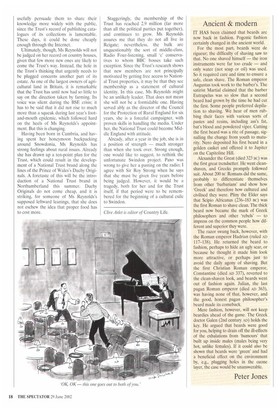Ancient & modern
IT HAS been claimed that beards are now back in fashion. Pogonic fashion certainly changed in the ancient world.
For the most part, beards were de rigueur; the difficulty of shaving saw to that. No one shaved himself — the iron instruments were far too crude — and only water (not soap or oil) was used. So it required care and time to ensure a safe, clean shave. The Roman emperor Augustus took work to the barber's. The satirist Martial claimed that the barber Eutrapelus was so slow that a second beard had grown by the time he had cut the first. Some people preferred depilation to shaving. We hear of men rubbing their faces with various sorts of pastes and resins, including ass's fat, bat's blood and powdered viper. Cutting the first beard was a rite of passage, signalling the change from youth to maturity. Nero deposited his first beard in a golden casket and offered it to Jupiter on the Capitoline Hill.
Alexander the Great (died 323 Bc) was the first great trendsetter. He went cleanshaven, and Greeks promptly followed suit. About MO BC Romans did the same, probably to differentiate themselves from other 'barbarians' and show how 'Greek' and therefore how cultured and civilised they were. Pliny the Elder says that Scipio Africanus (236-183 BO was the first Roman to shave clean. The thick beard now became the mark of Greek philosophers and other 'rebels' — to impress on the common people how different and superior they were.
The razor swung back, however, with the Roman emperor Hadrian (ruled AD 117-138). He returned the beard to fashion, perhaps to hide an ugly scar, or because he thought it made him look more attractive, or perhaps just to avoid the daily agony of shaving. But the first Christian Roman emperor, Constantine (died AD 337), reverted to the clean-shaven look, and beards went out of fashion again. Julian, the last pagan Roman emperor (died AD 363), was having none of that, however, and the good, honest pagan philosopher's beard made its comeback.
Mere fashion, however, will not keep beardies ahead of the game. The Greek doctor Galen (2nd century AD) holds the key. He argued that beards were good for you, helping to drain off the ill-effects of the exhalations from 'humours' that built up inside males (males being very hot, unlike females). If it could also be shown that beards were 'green' and had a beneficial effect on the environment by, e.g., plugging holes in the ozone layer, the case would be unanswerable.
Peter Jones


































































 Previous page
Previous page